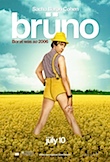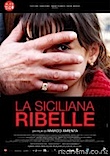 Sacha Baron Cohen is, in this reviewer’s opinion, the most gifted comic actor of his generation – a new Peter Sellers for those of us who remember who Peter Sellers was. A first-rate comedy technician, a virtuoso improvisor and virtually fearless, he has stolen films like Madagascar, Talladega Nights and Sweeney Todd from much bigger names. Why then am I left so cold by his most famous creations, Borat and now Austrian fashion reporter turned gay cultural icon Brüno?
Sacha Baron Cohen is, in this reviewer’s opinion, the most gifted comic actor of his generation – a new Peter Sellers for those of us who remember who Peter Sellers was. A first-rate comedy technician, a virtuoso improvisor and virtually fearless, he has stolen films like Madagascar, Talladega Nights and Sweeney Todd from much bigger names. Why then am I left so cold by his most famous creations, Borat and now Austrian fashion reporter turned gay cultural icon Brüno?
At first I thought it must just be a question of taste. After all, a rather large group of people at the Embassy on Thursday whooped and hollered and gave Brüno a round of applause. The editor of this paper told me it was her favourite film of the year. Maybe it is just me, but I didn’t laugh once – at least not at loud.
Brüno is a failed Austrian fashion show host who, desperate for fame at any cost, travels to the home of fame (the USA, of course) for some tips. Like Borat before him his cultural illiteracy would not be such a handicap if he didn’t also suffer from class‑A narcissism and absolute self-absorbtion rendering both his ears as tin as if they were owned by that real friend of Dorothy, the one from from The Wizard of Oz.
He gets himself an old-style cigar chewing Hollywood agent, tries to make a celebrity sex tape, has a crack at Middle East peace and adopts a third world baby but every effort is sabotaged by Brüno’s inability to, you know, get it. Which is the point, I understand that. But I don’t find humiliating people (who for the most part are decent honest people) to be particularly funny or praiseworthy and the supposedly anti-homophobia message comes uncomfortably close to the genuine article for my liking.
 With Brüno owning almost every cinema in town, and the Film Festival train belting along the tracks, there’s only room for one other local release: The Sicilian Girl is a true story about the daughter of a Sicilian gangster who, disgusted by all the violence and death informs on the family and becomes an icon for the anti-organised crime campaigns of the 1990s. With respect to CT letter writer Mike Barton, I’m going to go out on a limb here and call these wiseguys Mafia (clues include the Sicilian location and the fact that the leaders don’t bother putting their arms through the sleeves of their coats), but the film is considerably more prosaic than any Mafia film I’ve seen before (or even the essential Gomorrah which was reviewed here last month).
With Brüno owning almost every cinema in town, and the Film Festival train belting along the tracks, there’s only room for one other local release: The Sicilian Girl is a true story about the daughter of a Sicilian gangster who, disgusted by all the violence and death informs on the family and becomes an icon for the anti-organised crime campaigns of the 1990s. With respect to CT letter writer Mike Barton, I’m going to go out on a limb here and call these wiseguys Mafia (clues include the Sicilian location and the fact that the leaders don’t bother putting their arms through the sleeves of their coats), but the film is considerably more prosaic than any Mafia film I’ve seen before (or even the essential Gomorrah which was reviewed here last month).
The Sicilian Girl is drab and wearisome, with repetitive shouting matches and some clichéd subsidiary characters. You might find it worth persevering with, though, as (if you don’t know the story of Rita Atria) the ending is a real kicker. Then again, there’s always Wikipedia if you want to save yourself the trouble.
Printed in Wellington’s Capital Times on Wednesday 15 July, 2009.
Motes on screening conditions: Brüno at a public Friday night screening at the Embassy. Very raucous. The Sicilian Girl was a screener DVD from the distributor. Incidentally, New Zealand is one of the first territories to get The Sicilian Girl outside Italy and perhaps it arrived too soon.

